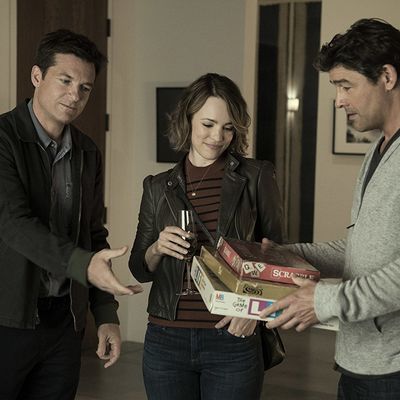
In 2017, I wrote what felt like many words about the fall of the mainstream comedy, from the workshopped-into-anonymity flops (Rough Night) to the dead-on-arrival studio unloadings (The House). Someday in film-history textbooks, they’ll write about the arc that began with the mid-aughts shedding of the “alt-” from alt-comedy. The subsequent bro-driven, smart-stupid, and very profitable salad days of Knocked Up, Superbad, and The Hangover led to the critical and commercial apex of Bridesmaids and the ascendancy of Melissa McCarthy, and continued into a long denouement, as Hollywood repeatedly reconfigures the same handful of elements all the way to 2018 — with notably diminishing returns. It’s a shame to watch, because it’s not as if the comedy world isn’t continuing to produce all kinds of great talent — it’s just that the lumbering process of putting together a mid-budget studio comedy feels ill-suited for their skills and the tastes of audiences alike.
Out of this morass comes Game Night, a film that from the outside would appear to be a continuation of this downward trend. (What industry study has convinced Hollywood that we won’t see a movie if it isn’t about some kind of Night? Date Night, Rough Night, Game Night … maybe it’s time to reboot the 1996 Stanley Tucci–Tony Shalhoub restaurant dramedy Big Night?) Co-directed by the writer and director of 2011’s Horrible Bosses and starring Bosses star Justin Bateman (still our current go-to beta-male protagonist, and one of the biggest beneficiaries of this latter-day comedy slump), there’s certainly no reason to believe that Game Night is out to revolutionize feature-length comedy. And it doesn’t, but it’s also confident and classically entertaining enough to withstand some kind of “I’ll watch it when it comes on cable” test of time, aside from an errant Skrillex reference or two.
Max (Bateman) and Annie (Rachel McAdams) are a middle-class married couple who’ve settled into the kind of comfortable groove that usually is the catalyst for a wacky comedy. Their life consists of intermittent, inconclusive conversations about whether or not to have kids, and their weekly game night with their other couple friends (Lamorne Morris, Kylie Bunbury, Billy Magnussen and, eventually the fantastic Sharon Horgan of Catastrophe). This settled peace is rudely interrupted by the arrival of Max’s pompous older brother Brooks (Kyle Chandler, clearly enjoying playing against type) who drops into town on “business” and hijacks Max and Annie’s game night by inviting their friends over to his opulent rental house for an immersive Mystery Night game. Of course, in the style of The Man Who Knew Too Little or, uh … Rough Night, a real-life crime intrudes on the supposed performance, sending a bunch of fragile-ego softies out on a flailing rescue mission.
The script by Mark Perez knows better than to let the ruse go on for too long, instead packing the second half with a series of “gotcha” twists that keep the audience constantly on the edge of credulousness. The bulk of the comedy is situational, the characters (aside from Magnussen’s riotously dumb himbo) are not types so much as they are a pack of petty, hypercompetitive straight men and women reacting to the escalating intensity of the supposed “game” they find themselves in. Bateman is doing a sharper-than-average version of the sighing and dead-eyed reaction shots we’ve seen him do before, but the stealth MVP is McAdams, who appeared on most of our radars as an effortless comedic actor in Mean Girls, but who has rarely been called upon to do the same since. Annie is twitchy and gung-ho, but also so soft-spoken that at times I wondered if her dialogue was actually recorded at a lower volume, making her stressful mutterings as she clocks guys with a fire extinguisher all the more strange and funny. There’s a standout scene between McAdams and Bateman in which Annie attempts to remove a bullet from Max’s arm, which utilizes a squeaky toy, a bottle of Chardonnay, and dual nausea to sublime comic effect. The moments where Game Night stands out are these, where the absurdity of the details can be the sum total of the joke.
The film also stars Jesse Plemons as Max and Annie’s pathetic, kinda-off neighbor who has been edged out of the group after he divorced his wife and got weird. His dead-eyed longing to be asked back into the group (as well as his too-convenient-to-not-turn-up-later occupation as a cop) turns out to be one of the more relevant through lines of the film, and the only thing that convinced me that Game Night wasn’t a late-stage market-researched title for the film. (After all, there aren’t many board games to be seen after 15 minutes or so, though there is a very cute use of charades at a crucial climactic moment.) The film is about the same kind of social overcompensation that virtually any other mainstream comedy is about, but it feels comfortable with this, not desperate to pile on the raunchy bells and whistles in an effort to feel more current. It won’t fix the studio comedy, but it’s a welcome, watchable outlier for now.

